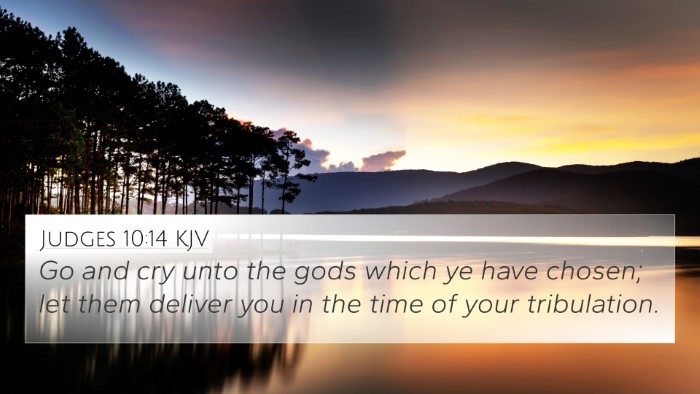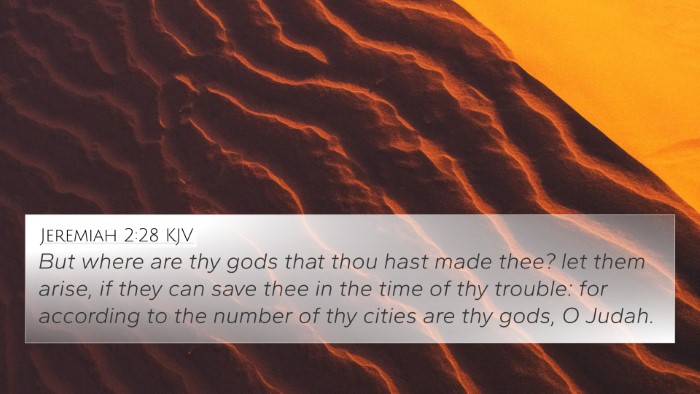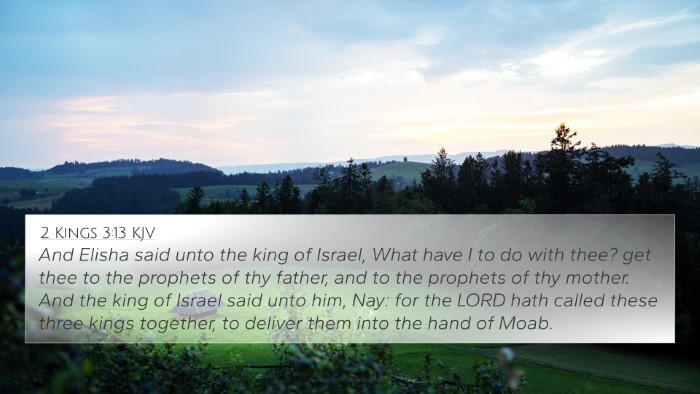Understanding Deuteronomy 32:37
Verse: “And he shall say: Where are their gods, their rock in whom they trusted?” - Deuteronomy 32:37 (ESV)
Meaning and Interpretation
This verse encapsulates a powerful rhetorical question posed by God, challenging the faith of those who trust in false gods. It serves as a reminder of God's sovereignty and the futility of misplaced trust in idols. The verse is part of the Song of Moses, which articulates the faithfulness of God contrasted against the unfaithfulness of Israel.
Insights from Public Domain Commentaries
-
Matthew Henry:
Henry emphasizes that this verse is directed toward the people’s reliance on their idols. He notes that God will challenge them regarding their trust in these false deities at a time of distress, highlighting the inevitable failure of idolatry when compared to the genuine protection and support from the true God.
-
Albert Barnes:
Barnes points out that the question serves as a declaration that the gods in which Israel trusted were unable to help them in times of trouble. He stresses the idea that those who have turned away from God are left with no security when calamity strikes, presenting a clear contrast between divine hope and human disappointment.
-
Adam Clarke:
Clarke provides a historical context, noting that Moses was calling to remembrance the covenant people’s past reliance on God for safety and deliverance. He elaborates on the nature of false gods, reminding readers that they are impotent and cannot deliver when it really matters.
Key Themes
- Divine Judgment: The verse illustrates God's impending judgment upon those who have turned to idols.
- Faithfulness of God: A core theme of the verse is the unwavering faithfulness of God opposed to the fickleness of human idols.
- Idolatry: The dangers of idolatry are highlighted, warning against the reliance on created things rather than the Creator.
- Rhetorical Questions: The use of rhetorical questions in scripture serves to provoke thought and introspection among believers.
Bible Cross-References
This verse interacts with multiple scriptures, reflecting a thematic continuity throughout the Bible. Here are ten relevant cross-references:
- 1 Kings 18:21 - The challenge posed to Israel about serving the Lord or Baal.
- Jeremiah 2:13 - “For my people have committed two evils: they have forsaken me, the fountain of living waters, and hewed them out cisterns, broken cisterns, that can hold no water.”
- Psalm 115:4-8 - A description of the impotence of idols compared to the living God.
- Isaiah 44:9-20 - A vivid illustration of the folly of idol-making and worship.
- Galatians 4:8-9 - The danger of reverting back to weak and worthless elemental things.
- 1 Corinthians 10:14 - “Therefore, my beloved, flee from idolatry.”
- Exodus 20:3-5 - The commandment against having other gods before God.
- Hosea 14:8 - A returning to God with a recognition of the futility of idols.
- Matthew 6:24 - “No one can serve two masters.”
- Revelation 21:8 - The fate of idolaters and the unfaithful before God.
Application for Today
In examining Deuteronomy 32:37, believers today are reminded to evaluate their trust and reliance in various aspects of life. Are we placing our faith in temporal things or the eternal God? This scripture encourages self-reflection and a return to a faithful relationship with the Lord, emphasizing the need for a steadfast and unwavering commitment to Him.
Conclusion
Deuteronomy 32:37 serves as a timeless reminder of the dangers associated with idolatry and the importance of anchoring our faith in God alone. By understanding the connections between this verse and others, readers can glean profound insights into the nature of divine faithfulness versus human failure. Through careful cross-referencing, believers can enhance their understanding of scripture and deepen their spiritual journeys.





